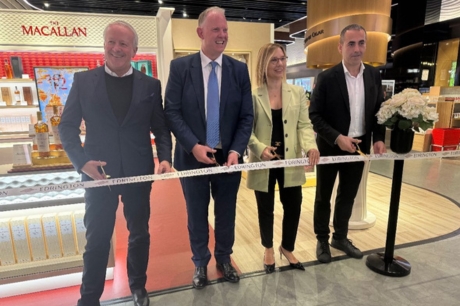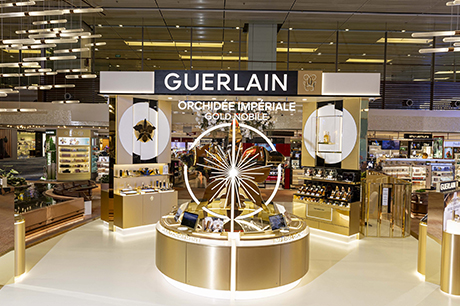Duty free execs uneasy over Dufry’s power grab
By Kevin Rozario |
 A flash survey* by TRBusiness about Dufry’s planned purchase of a controlling stake in rival World Duty Free reveals that more than 55% of respondents believe this further acquisition (following the Nuance deal last year) is bad for travel retail.
A flash survey* by TRBusiness about Dufry’s planned purchase of a controlling stake in rival World Duty Free reveals that more than 55% of respondents believe this further acquisition (following the Nuance deal last year) is bad for travel retail.
Furthermore, 85% say that a company with a 24% share of the global DF&TR airport market [which Dufry claims it will have as an integrated Dufry/WDFG/Nuance entity], is either pushing the limit on market share (49.3% believe this), or is already far too big (35.8%). Only 14.9% of respondents feel that a company holding such a large share of the channel is perfectly fine and could even be increased.
 CONCENTRATION OF MARKET POWER
CONCENTRATION OF MARKET POWER
Concerns over the concentration of market power have risen in the few months since last summer. The majority of people (55%) who feel the WDFG acquisition is bad for DF&TR is much higher than when TRBusiness poled executives over the Dufry/Nuance deal in June 2014.
 Then, 45.4% said it was bad for the industry while more than a third (36.1%) said it was good. This time, just 22.4% believe it is good for the industry. And on general consolidation in the DF&TR marketplace, 44.8% think it has gone too far, 34.3% believe it is proceeding at the expected pace, and one in five (20.9%) feel it can still go further.
Then, 45.4% said it was bad for the industry while more than a third (36.1%) said it was good. This time, just 22.4% believe it is good for the industry. And on general consolidation in the DF&TR marketplace, 44.8% think it has gone too far, 34.3% believe it is proceeding at the expected pace, and one in five (20.9%) feel it can still go further.
FEARS LAID BARE
This survey elicited some strong comments from the industry – particularly on the negatives rather than the positives – for the channel.
Among the biggest concerns were the further squeezing out of smaller suppliers; higher margins, potentially tighter relationships with ‘big portfolio’ brand owners at the expense of other competitors, and undifferentiated airport stores.

One North American fashion agent/distributor comments: “Dufry will now squeeze suppliers even further. Payment terms, pricing, margins will be more difficult for some suppliers. With this ‘annexing’ of operators by Dufry, there are fewer buyers with whom to work. This ultimately hurts the regionalisation of many products, and Dufry will be like the McDonald’s of duty free.” [Presumably that reference is to the ubiquity of the retailer, and not its positioning-Ed].
Another North American wine and spirits supplier adds: “Everyone loses… it no longer is an exciting channel; travellers will be bored with the static offerings; margin requirement will be pushed up, so there will be either higher prices or less-engaged suppliers.”

‘IT’S A BIT SCARY…’
A wine and spirits supplier in Europe says: “Smaller companies might, most probably, not be considered anymore; assortments will be more global and mainly an opportunity for multinationals. Customers might find the same offer at most duty free shops with less individual assortments or local products.”
Also in Europe, a jewellery/accessories supplier says: “It is a bit scary to have one super power in DF&TR: there is too much power in one hand. Basically if you are on Dufry’s good side it’s great as there are more opportunities for the brand, but if it’s the other way around it could lead to some big loss.”
In the Baltic, Magnus Skjorshammer, Head of Business Development at Tallink Duty Free, says: “With fewer operators to deal with, this is not necessarily an advantage for smaller suppliers. Larger suppliers will benefit as global deals can easily be made. Losers in the end may well be the passengers who could find the same products no matter where they go.”
A European fragrance supplier agrees, saying that the winners will be the biggest brand owners, adding: “The smallest suppliers will have more and more difficulties accessing the industry (due to) the operator’s requirements.”
ON THE PLUS SIDE…
The survey also produced some views in favour of further consolidation in DF&TR in the broad belief that a streamlining of the channel would bring efficiencies and potentially change the power balance between operators and airport landlords.
Abhijit Das. Head Marketing at Delhi Duty Free Services [but commenting in his own personal capacity] says: “If the M&A process is smooth, I do not think it will be bad for anybody and 75% of the market is still there, leaving ample potential for growth of others individually or through further M&A. Of course pitching for new business will be tougher. The only downside can be if the M&A is not handled smoothly especially while the Nuance process is underway.”

One landlord, also in Asia, comments: “Consumers may benefit from lower prices of products and services if Dufry chooses to pass on the savings from economies of scale and bulk purchasing to end users. But I feel this is unlikely. Any savings from the above will likely flow to Dufry’s bottom line.”
At specialist fashion & accessories supplier Blue Storks, which admits it “prefers to work with few but high quality operators”, Managing Partner, Frederik Westelinck, says of the acquisition: “Important economies of scale can be made. But the most important thing is that the travellers win something from this deal. Satisfying their needs is key for the whole industry. This is the challenge. They need, in the end, a better retail environment with the right products at the right price and at the right place.”
GLOBAL, BUT ALSO LOCAL
“To get the benefits of this merger, we believe there should be a mix of a strong integration with an ability to fit local tastes. Local brands could have some difficulties to penetrate this market since the priority for global operators will be elsewhere,” Westelinck adds.
In Europe, a Wine & Spirits player comments: “It should make retail a better experience on the whole as Dufry has been committed to driving good retailtainment. I hope it will provide some logic in the bidding processes for concessions that have left too much of the value chain with the airports.
“It will rationalise the channel a bit further which will be a good thing. The channel is a difficult one to run well so it needs to have players committed to long-term development.”
But the same person notes: “If Dufry choose to, then suppliers will find themselves stretched over a bigger barrel. There is a risk that the consumer will have the same experience.”
Suppliers made up the majority of responses at 44.8% followed by retailers/operators at 22.5% and unclassified ‘others’ at 19.4%. Almost two thirds of the answers (65.7%) came from Europe-based readers, followed by North America (20.9%), Asia (7.5%), South America (4.5%) and Africa (1.5%).
For fuller details of the survey, and a wider range of replies, read the May issue of TRBusiness, out soon.
[*The survey was emailed to DF&TR executives in the lead-up to the Easter weekend with a three-day time frame for replies. In total 67 individuals responded. Please note that the views expressed in the article above are entirely those of the respondents, and not TRBusiness.]
TR Consumer Forum: Agenda & speakers revealed
Influential speakers will unpack the most effective strategies for understanding and engaging...
OUT NOW: March/April Leading Americas Operators
The TRBusiness March/April 2024 edition boasting the inimitable leading Americas Operators...
Saudia Arabia's KKIA unfurls T3 duty free expansion
King Khalid International Airport (KKIA) has unveiled the first stage of its much-vaunted duty...
-
 International,
International,TR Consumer Forum: Agenda & speakers revealed
-
 International,
International,OUT NOW: March/April Leading Americas Operators
-
 International,
International,Saudia Arabia's KKIA unfurls T3 duty free expansion

In the Magazine
TRBusiness Magazine is free to access. Read the latest issue now.

 Trbusiness. The travel retail Trbusiness. The magazine for global retail and duty free professionals.
Trbusiness. The travel retail Trbusiness. The magazine for global retail and duty free professionals.





















